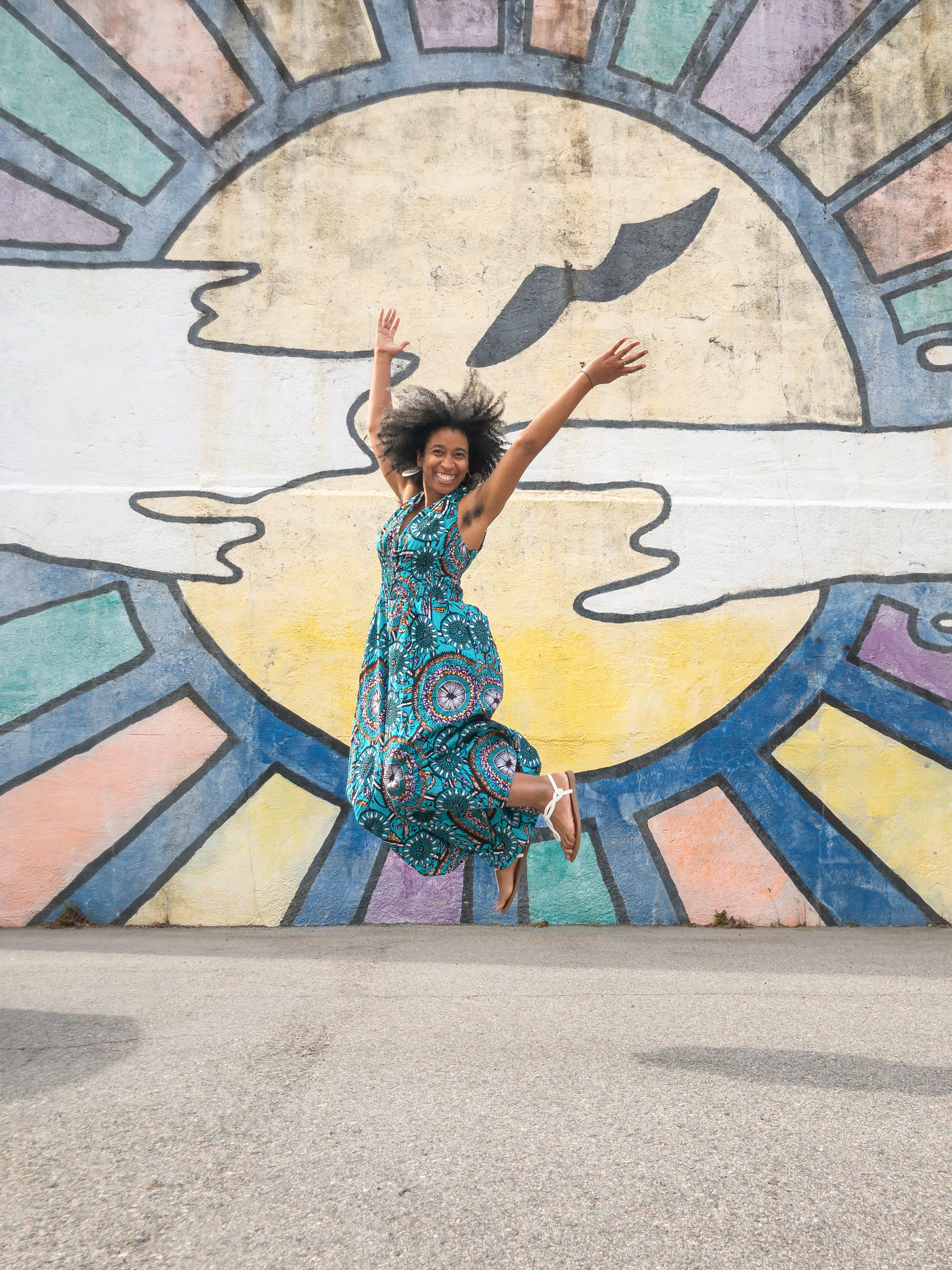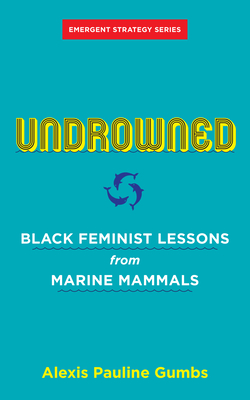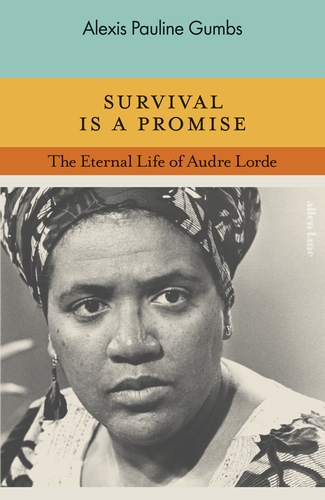Alexis Pauline Gumbs is the author of Undrowned: Black Feminist Lessons from Marine Mammals, Dub: Finding Ceremony, M Archive: After the End of the World, and Spill: Scenes of Black Feminist Fugitivity, and co-editor of Revolutionary Mothering: Love on the Frontlines. Her writing has appeared in publications including Make/Shift, Left Turn, The Abolitionist, Ms. Magazine, and more. She holds a PhD in English, African and African American Studies, and Women and Gender Studies from Duke University and is the co founder of Black Feminist Film School, an initiative to screen, study, and produce films with a Black feminist ethic. In 2020, she was awarded the National Humanities Center Fellowship for her book-in progress, The Eternal Life of Audre Lorde. She lives in Durham, North Carolina.

-
UndrownedBlack Feminist Lessons from Marine Mammals
The bowhead whale lives for centuries and could potentially grow forever. Researchers say their spines don’t set, so even at two hundred years of age they might still grow. Yesterday, through a dear friend, a complete stranger gifted me a whale vertebra that might be from the eternally possible spine of a bowhead whale.
What a heavy piece of oracle. Yes. Honor the bowhead whale whose large proportion of body fat keeps them warm enough in the Arctic to outlive the various weapons used to kill them over time. I have said it before, I will say it again, fat is a winning strategy. New research suggests that young bowhead whales may even take nutrients from their bones, to further grow their baleen (the food filters in their mouths) in order to be able to eat more krill, grow more fat, live more better. Evolutionary geniuses.
My own backbone has been teaching me something too. My pediatricians diagnosed me with scoliosis as a school-aged child, and we may never know if I was born this gorgeously crooked or if the early weight of heavy books caused a shift in how I would carry myself through this life. What we do know? The books certainly were heavy and I haven’t yet put them down. And also I walk, sit, and move in the world in a way that overstretches part of me, compresses the other side. Undrowned : Black Feminist Lessons from Marine Mammals
Undrowned : Black Feminist Lessons from Marine Mammals- Print Books
- Find your local bookstore (via IndieBound)
- Bookshop
-
UndrownedBlack Feminist Lessons from Marine Mammals
They say river dolphins don’t leap as much as dolphins in the ocean. Because of turbid flows of rushing water, they do not trust their eyes. Their eyes grow small. Echolocation becomes crucial. Their listening becomes more nuanced. They become experts of shape, and shape themselves to become narrow, reaching forward like the river. River dolphins all over the world (in the Ganges and Amazon rivers for example) are not close genetic relatives. But they are remarkably physically similar. They have grown common forms due to their common circumstances.
Have you grown that way, riverine? In a context that moves so quickly that looking at it tells you almost nothing. Are you evolving a deeper way of listening where you are? Could we become students of shape precise enough to move with the grace and flexibility our circumstance requires even though your river is not my river? Undrowned : Black Feminist Lessons from Marine Mammals
Undrowned : Black Feminist Lessons from Marine Mammals- Print Books
- Find your local bookstore (via IndieBound)
- Bookshop
-
UndrownedBlack Feminist Lessons from Marine Mammals
They say, when the singing seal is threatened, she sings inside her throat a trill, a chug, a lock, beatboxes till you turn away. But then some others say they cannot tell. When she opens her mouth, arches her neck, is it aggressive or submissive? Is it fighting stance or friendship? Who’s to say? The singing seal is rarely seen and usually alone. It took a while to figure out how they mate at all. Like some other seals, she can hold her pregnancy like a secret, delaying implantation until she finds the right place, the right time, the worthy ice. So gestation is nine months, but not from conception, from implantation. Something happens deep inside her when no one else is around. Something only she knows happens when she’s ready and not before.
Me too. Maybe you don’t know if I am singing or screaming sometimes. Maybe you don’t know if I want you to stay or leave. Maybe I hold my secrets deep within on my own time, and use my oversized eyes to dive so deep you cannot see. So you don’t. See me. It is something, living on pack ice and eating squid from the bottom of the ocean. And then coming up into cold air to sing. There is something that I need, but I have to go so deep to find it. There is something I have to give, but I have to give it on my own time. There is something I’m going to tell you, but first I have to make a language for myself and the place I live that doesn’t steal me from my purpose. Will you wait? There is something I’m going to tell you, just let me open up my mouth. See if I sing. Undrowned : Black Feminist Lessons from Marine Mammals
Undrowned : Black Feminist Lessons from Marine Mammals- Print Books
- Find your local bookstore (via IndieBound)
- Bookshop
“Alexis Pauline Gumbs pushes us out of our comfort zone and into the sea, where other species are moving and mothering in ways that can teach us how to survive. With her beautifully rendered reflections on the habits and habitats of seals, otters and manatees, Gumbs shows us that humans aren't the only ones affected by climate change, and that other mammals know the pain of having their children hunted. Undrowned is a gift and its message is clear: The natural world offers solutions if we just pay attention.” —Dani McClain, author of We Live for the We: The Political Power of Black Motherhood
“Reading Undrowned, I am re-convinced of the revolutionary potential of the life sciences, and in particular, of the necessity of a Black feminist biology . . . . Gumbs offers much-needed examples and practices for how to become sensitive and responsive to our sensitive, responsive kin-beyond-species. It is this loving attunement that makes Undrowned a work of poetry and of biology at its most perceptive and generative."
—Kriti Sharma, author of Interdependence: Biology and Beyond
“Alexis Pauline Gumbs breaks the surface of living as human and deep dives the depths of life in the planet’s oceans, where human life began but is now a danger to. Gumbs’s riveting, loving, genre-bending embrace of marine mammals and the human peril facing them, her mammal love, charges us to rethink and re-behave what it means to be human as she reminds us humans are mammals too, all life is sacred. On every page, Gumbs offers us a new definition of philosophy, a new definition of evolution.” ―Alexis DeVeaux, author of Warrior Poet: A Biography of Audre Lorde [on Undrowned]
Selected Works

- Print Books
- Bookshop

- Print Books
- Find your local bookstore (via IndieBound)
- Bookshop
In Undrowned, Alexis Pauline Gumbs has written a singular hybrid of hymn, field guide, and self-care manual that urges us to reassess our place among our fellow living beings. Its intellectual risk centers on the premise that love can be our most radical and transformative act. Her tales of sea life entwined with meditations on Black feminism become modern fables that offer new methods of feeling, and insist with the best of environmental literature that protecting the planet’s collapsing animal ecologies is vital to saving what makes us human. This wild prose poem is about an Other that turns out to be ourselves.